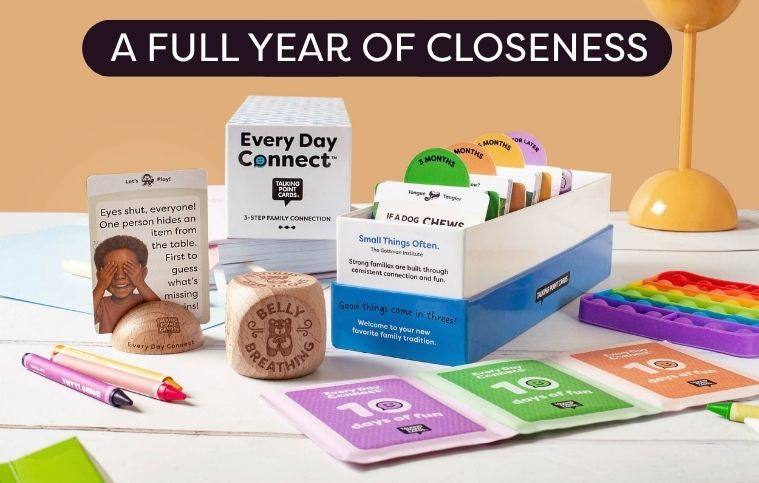SHOP
About
The Teen Perspective
Encouraging Expression and Listening to Understand

Alright, let's talk about something that seems deceptively simple but can quickly turn into a gnarly mess of confusion, angst, and slammed doors. (Because what teen conversation doesn't involve at least a little door-slamming?)
I'm talking, of course, about teen conversation - that beautiful, baffling dance between adolescents grappling with raging hormones and identity crises, and the parents/teachers/authority figures trying to guide them through it all.
As someone who was once a sulky, sarcastic teenager (and still kind of is on the inside), and who now has to deal with tiny puberty-bombs of my own, I think I'm moderately qualified to wax philosophical on this beguiling subject. At the very least, I've been on both sides of the warring
teen-adult coin.
So let's dig into what makes communication with teens so uniquely challenging, and more importantly, what we can do as the Responsible Grown-Up Parties to keep those vital lines of conversation open.
The Chasm of the Unknown Known

One of the biggest hurdles in teen communication is the fact that adults and teens are operating in two entirely different mental realms.
We adults live in the "Known Known" - with all our decades of collected wisdom, achieved goals, and metabolized life experience giving us established perspectives on issues ranging from romance to career to belly button lint. We think we've got it all figured out.
Teenagers, on the other hand, are stuck in the terrifying "Unknown Known" - aware that all this deep, meaningful stuff exists (love, purpose, proper laundry technique), but feeling completely clueless as to WTF any of it means. Every day brings new befuddling experiences and emotions they've never encountered before.
So when we try to relate to each other's worlds, there's an almost comical level of cross-purposes. We dish out earnest life advice about college apps and using a top sheet, and they regale us with the philosophical quandaries of whether bread makes good throwing ammunition.
It's two ships passing in the night - except one ship is a galleon loaded with ancient spice wisdom and the other is a dinghy furiously rowing in circles and asking if the Pythagorean theorem is edible.
(No sweetie, it's not edible - but it can help solve your crush's confusing mixed signals! Math = universal translator!)

Express Yourself (But in a Way I Understand)
One of the biggest complaints parents/teachers have is that their teens seem to barely express themselves at all, beyond some combination of:
-
Shrugging
-
One-word answers
-
Murmuring into clothing
-
Speaking entirely in slang/internet memes
Which, to be fair, is an absolutely maddening way to try and maintain a productive conversation. It's like being stuck in a real-life dialog box where your only choices are "K", "Yeet", and *vague gesturing*.
The truth, though, is that teens aren't TRYING to be uncommunicative little gremlin gremlins. They're just working through a crucial stage of self-discovery and desperate identity-forging.
Often communicating their every random, unpolished thought feels like stripping emotionally naked in front of people they still semi-idolize as authority figures. It's painfully vulnerable! So they end up stifling themselves and resorting to vague gestures rather than true expression.
In these moments, it's key for us to:
1 - Not take the lack of in-depth communication as a personal affront (even though it absolutely feels like one).
2 - Find lower-stakes ways for them to start opening up, through:
-
Side conversations during hobby activities
-
Making it clear we don't judge their half-formed thoughts
-
Sharing our own cringeworthy adolescent experiences to build trust
-
Speaking their language - using emojis, memes, vague gestures, etc.
3 - Be an active, empathetic listener when they DO decide to express something meaningful. Because...
The Key to Teen Communication: Shut Up and Listen

"The biggest communication problem is we do not listen to understand. We listen to reply."
You know that classic bit of wisdom up there? It was absolutely made for the freakin' Grand Canyon-sized communication gap that is the teen years.
When our kids do work up the nerve to express things that are deeply troubling or exhilarating or confusing to them, our first instinct is often to jump in with commentary, judgement, or - god forbid - ADVICE before they've even finished a full sentence.
Maybe we can't help it - we're just That Eager to re-assure them or to relive our own old war stories. But interrupting a teenager's fragile expression is the conversational equivalent of snatching their diary mid-sentence and reading it out loud at a high school assembly.
(Do you want a repeat of the toilet papering incident, Sharon? Because this is how we get a repeat toilet papering incident.)
The quietest revolution we can make as parents, teachers, and fellow humans is simply to shut our traps and listen with every ounce of attention. Don't interrupt, don't judge, don't even acknowledge that we've heard them until they're firmly finished.
THEN - maybe wait a merciful 4-5 seconds just to make sure.
It's pure torture, this petrified silence. But it's in these pockets of patient listening that real communication can finally bloom. They'll feel heard and understood. They'll know their silliest passing thoughts and deepest insecurities aren't being instantly swatted down by voices of reproach.
This is the only way they can find their voice and perspective and start navigating that big ol' Unknown Known.

Giving Them the Tools for Confident Communication
Of course, we can't rely on polite silence alone to raise a generation of self-assured, articulate young adults (as fun as one big perpetual quiet game sounds). To help them really develop their communication skills and their ability for clearheaded expression, there are a few things we can do:
-
Read every form of communication style as a family - analyze great speeches, novels, op-eds, poems, etc. to expand their communication literacy
-
Write together! Creative writing exercises or even keeping casual household journals helps them get comfortable translating thoughts into words.
-
Provide safe, structured opportunities to practice public speaking - at family dinners, group discussions, etc
-
Celebrate and reward excellent communication when we see it, so they'll hunger to recreate that feeling.
Granted, it'll all feel like a slow, uphill slog sometimes. Trust me, weeks or months of our stellar communication tutelage may only yield uncommunicative feats like:
"Ughhhh."
pause
"No, just... everything is dumb."
But pay close attention, and you'll see little glimmers of thoughtful articulation start peeking through - in their texts, their TikTok tête-à-têtes, their casual roasts of teachers and celebrities.
It's happening!
With enough time, trust, and active listening from us, those glimmers become an unstoppable lodestar guiding them to full-fledged understanding of their own perspectives. And eventually?
Those little punks may even begin to eloquently, thoughtfully convey those perspectives.
Le gasp!
Communication between teens and adults isn't something that can be mastered overnight. It requires patience, mutual openness to expression, a ton of uncomfortable silence, and accepting that they're essentially learning an entirely new language.
But by approaching it with that same teen mix of hopefulness and mild angst, we can make huge strides in closing those generational conversation gaps. And isn't that the whole point?
So don't lose hope when they're grunting one-word answers or reciting meme hieroglyphics at you. They're working on it. We're ALL working on it. Deep down, we're all just emo kids scribbling in diaries, trying to sort out our feelings - the teenage soul never really goes away! When we acknowledge that, real communication and teen conversation just gets incrementally easier over time.
Plus as an added bonus, nailing those communication skills now may just save you from a few toilet paper pranks down the road. Anything to avoid having to sheepishly re-enact that scene later in life
LIKED THIS ARTICLE?
SIGN UP FOR MORE!






